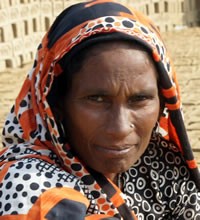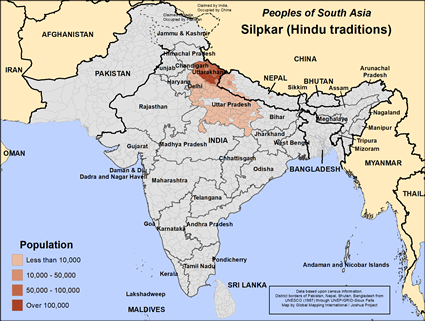Silpkar (Hindu traditions) in Nepal

Photo Source:
Copyrighted © 2026
Isudas All rights reserved. Used with permission |

Map Source:
People Group data: Omid. Map geography: UNESCO / GMI. Map Design: Joshua Project.
|
| People Name: | Silpkar (Hindu traditions) |
| Country: | Nepal |
| 10/40 Window: | Yes |
| Population: | 63,000 |
| World Population: | 999,000 |
| Primary Language: | Nepali |
| Primary Religion: | Hinduism |
| Christian Adherents: | 0.00 % |
| Evangelicals: | 0.00 % |
| Scripture: | Complete Bible |
| Ministry Resources: | Yes |
| Jesus Film: | Yes |
| Audio Recordings: | Yes |
| People Cluster: | South Asia Dalit - other |
| Affinity Bloc: | South Asian Peoples |
| Progress Level: |
|
Introduction / History
The name Silpkar is generally used for the communities categorized lowly and residing in the hilly areas of Uttar Pradesh. The Silpkar are also known as Dom, Dum, Ram, Arya and Harijan. The Silpkar belong to an aboriginal people, and it is said that they were reduced to a state of slavery by the Khasia and later by the immigrant high castes in the historical past.
The Silpkar are divided into different hierarchically arranged groups based on their hereditary occupations. The first group is referred to as Mistri, which includes Lohar, Tamta and Orh, etc. The second group includes drummers such as the Dhobi, Damai and Bajgi. The third group includes serfs, vagrants and beggars.
What Are Their Lives Like?
Various occupational groups of the Silpkar still pursue their traditional hereditary occupations such as black smithy, copper smithy, basketry, masonry, oil-pressing, drum-beating and leather-work, etc. They also engaged in agriculture and animal husbandry, manufacture agricultural implements, making baskets and household utensils, etc. Their staple cereals are wheat, rice and maize.
They will intermarry with groups that have the same status. Adult marriage is the norm through negotiation. They cremate the dead, and the death pollution is observed.
What Are Their Beliefs?
Some of their deities are Bhairon, Betal, Kalchhin, Kalua, Chhurmall and Gangnath, etc. These deities are worshipped as family, village and regional deities.
What Are Their Needs?
The Silpkar people need to put their hope in the King of kings, realizing that he is the one who provides protection, hope and dignity to all who call on his name.
Prayer Points
For the Holy Spirit to pursue their leaders until they open the community gates to the gospel.
Pray for loving and dedicated workers to go to them.
Pray for good educational facilities, rehabilitation and vocational training.
Pray for health problems such as color-blindness may be healed.